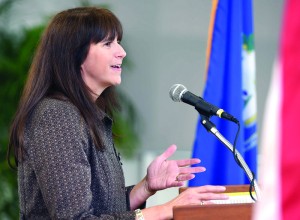On Oct. 2, there was standing room only as numerous staff, faculty, students and elected officials from Connecticut gathered in the Alumni Lounge to hear the announcement of the Tow Institute for Youth Justice.

This program, made possible by the Tow family’s generous donations and dreams to help alleviate pain and suffering, as said by Emily Tow-Jackson herself, will be the first of its kind to focus on leadership, training and education of future leaders in juvenile justice.
Numerous honorable speakers said amazing things about the program and the positive outlooks everyone expects to come from it. The years of work it already has behind it along with the amazing staff that they have lined up has ensured that it will live up to the University of New Haven expectations.
Lieutenant Governor Nancy Wyman spoke and said that Connecticut currently has the highest reduction of juvenile incarceration in the country, and that with the implementation of the Tow Institute at UNH “we will continue to keep going strong.”
Mayor of New Haven Toni Harp has only positive things to say, ensuring that “this institution will help students help children in trouble.”
The city of New Haven will benefit as well from this program because, in addition to the institution, the co-op will enable students to take a semester off of school while remaining a student to work full time. This will provide settings for them to work in the field of their choosing and aid the community.
She said many inspiring things about the work the UNH community will be able to do to help, including that the Tow Institute for Youth Justice is “as of today a part of the reform system” in the state of Connecticut and that we “should not, cannot, and will not give up on juvenile offenders.”
UNH’s own Professor Carbone has had a big part of making this happen. Every person who spoke mentioned him and his hard work in developing this program.
Congresswoman Rosa Delauro put his work into perspective the best in saying that “his commitment to making a difference in the life of others has really made a different in the community—particularly in our most vulnerable youth.”
When Toni Walker, State Representative of the ninety-third District and Chair of the Juvenile Justice Planning and Oversight Committee, spoke, the audience got to learn how the Institute came to be.
We heard about all the people and relationships that helped make her dream a reality.
“Children have to make mistakes and they do- but don’t incarcerate them for it,” Walker said.
Her passion behind her work was extremely evident and you could see how proud she was for this to be happening. She also wanted to make sure that everyone in the audience knew that “partnership and questions are the key things, they are the way you are going to make change- we can make a change in this society through partnerships and asking questions” and that is exactly what she did.
The final speaker was Emily Tow Jackson, who said that this happening was completely overwhelming but exciting and a thrill, that to work in philanthropy you have to have big dreams.
She agreed with Toni Walker and said that she had “dreams to alleviate pain and suffering but you need more than money- money is not enough- you need partnerships.”
She said that there are expectations for this Institute—they “expect really ambitious ideas will be incubated to shape youth justice in the future.”
Everyone who spoke thanked the Tow family, but President Kaplan spoke about how his job often is working with very wealthy people and trying to “enable people of great wealth to change the world” and so to the Tow Family he thanked them profoundly—for their vision and their leadership.










